
- Best Hikes In The World
- Appalachian Trail
- European Hikes
- Nepal Hikes
- Patagonia Hikes
- See All Hikes
- Mount Kenya
- Mount Kilimanjaro
- Mount Toubkal
- See All Mountains
- South Africa
- New Zealand
- Switzerland
- United Kingdom
- Packing Lists

Climb Mount Toubkal – Complete Guide to North Africa’s Highest Summit
Africa , Hikes , Morocco , Mountains
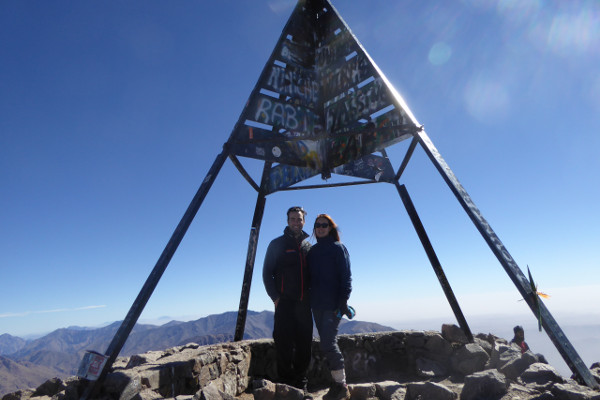
Welcome to our complete guide to trekking Mount Toubkal ! Immerse yourself in the vivid culture of Morocco and climb the highest peak in North Africa.
With breath-taking views of the Atlas Mountains, green valleys, and endearing Berber villages, Mount Toubkal will not disappoint. The trek may be moderate in difficulty , but the journey will be difficult to forget.
Below you will find a full guide on everything you will need to know before you climb Mount Toubkal . We booked our guided trip through a company called Skyhook , and had so much fun on this experience (see video below).
Mount Toubkal Overview
Where is mount toubkal.
Mount Toubkal or Jebel Toubkal is the highest peak in North Africa. Toubkal is apart of the Atlas Mountain Range and is located in the southwestern part of Morocco, about 60 km south of Marrakesh .
Can You Climb Mount Toubkal?
Mount Toubkal is a non-technical summit with its highest peak at 4,167 meters. At the peak awaits views of a dramatic border between land, ocean, and desert.
There are two approaches to reaching Toubkal, the South and the North. The Southern approach is the most popular and straightforward, while the Northern route is longer and best for experienced hikers.
One of the popular features about Mount Toubkal is that you can trek the mountain and be out of Morocco in 4 days. You would want to do this with caution in order to allow for acclimatization due to the high altitude, but this makes an excellent long weekend holiday full of adventure.
History Of Mount Toubkal
In 1923, Vincent Berger, Hubert Dolbeau, and Marquis De Segonzac were the first Europeans to summit Toubkal. A year later, the height of Toubkal was formally recorded and the trigonometrical structure was carried to the peak in 1931.
How Fit Do You Need To Be To Climb Mount Toubkal?
Toubkal is for keen walkers and hikers with a moderate fitness level. Toubkal is a fun and challenging trek with gratifying views from the peak. You will see the remote villages of the Berber people, roaring waterfalls, rivers, and the crash site of a cargo plane, depending on your route.
If you join an organised tour group, your guide will bring along food and mules with muleteers will be used to carry all of your things. If you decide to trek independently, then you will need to arrange refuges to eat and rest, and carry your own gear.
Join a Mt Toubkal Hike
Book with our recommended local guide
Typical Itinerary
This itinerary follows the most common route to Toubkal on the South. We highly recommend itineraries that build in one or two more days for acclimatisation.
Day 1: Arrive in Marrakech, drive from Marrakech to Imlil, and spend the night in Imlil
Day 2: Trek to Refuge Camp and spend the night
Day 3: Trek to Toubkal via South Side and descend via South Side
Day 4: Return to Imlil and spend night
Day 5: Return to Marrakech Menara Airport
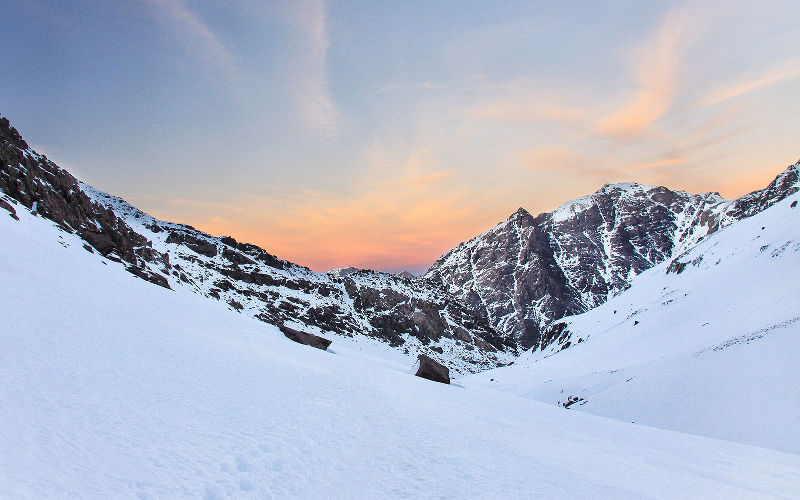
A Toubkal Winter Ascent is an awesome challenge, but does require some technical mountaineering skills.
Independent Trekking vs. Guided Treks
Why hike mount toubkal without a guide.
An experienced hiker could most definitely trek Mount Toubkal alone. There are many villages and settlements on your way to the peak in case you get lost. If you are trekking during the spring, you are likely to be surrounded by numerous amounts of hikers who could guide you in case you get lost.
There are two refuges at the base of the mountain (more on this below), where you can get food and sleeping quarters (please note: these refuges get busy during the peak season so booking ahead is advised).
It is important to note that there are many summits in this area. Ensure you are using the correct path to get up Mount Toubkal. Otherwise, you could get lost.
Why Hike Mount Toubkal With A Guide?
If you are not very experienced in hiking at altitude or just prefer having the logistics of a trip arranged for you, then we recommend you employ the services of a guiding company.
Guide companies typically arrange the whole trek for you. This is including accommodation, transport to and from Marrakech, food on the trek and mules to carry gear.
A guided group trekking experience allows you to interact with other hikers. You will have the opportunity to make friends with people who have similar interests.
A guide provides peace of mind, so you can focus more on the views and less looking at a map. They are likely to have gone up Toubkal hundreds of times and know exactly where to go and when to take breaks.
Guides ensure you get plenty of food and water, which is crucial for any trek. There will be water sources along the way but it is best to bring your own water bottle and water purification tablets.
Overall, having a guide is best for convenience and safety. A guide is especially useful when visiting Toubkal in winter due to the dangers of slipping and getting lost in freezing temperatures.
Popular Routes
There are two main approaches to trekking Mount Toubkal - the South and North Side routes. There are a few other variations but these require more experienced hiking and a longer expedition. The most common route begins on the South side.
The Southern route is mostly commonly used because it is significantly easier and has worn paths making the trail easy to follow. It is followed by 98% of trekkers. The Northern approach is a longer route and requires a skilled hiker. Even when taking the more difficult route for the ascent, it is recommended that you use the popular South side route for your descent.
During the spring and summer months, Toubkal is certainly a hike/trek rather than a climb.
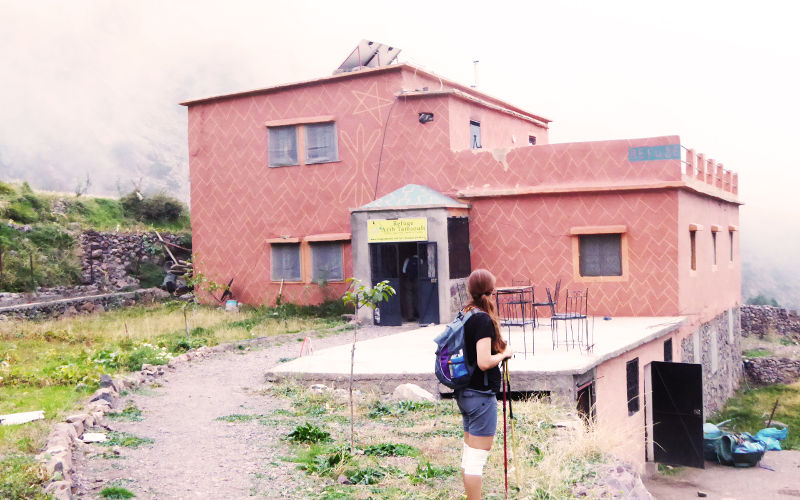
A cool Refuge at Azib Tamsoult.
It is non-technical but moderately difficult due to some steep slopes (no climbing required, but you will need to scramble occasionally) and the high altitude. You should be prepared to walk for several hours each day, depending on the route and duration of your trek. There is a risk of altitude sickness , but this is easily avoided through proper acclimatisation.
During winter, Toubkal becomes a technical hike and requires special gear. You should highly consider booking a guide and ensure you are familiar with using an ice axe and crampons (see details on a winter ascent below).
Trekking Toubkal should take you 4-5 days in order to properly acclimate and allow for a nights rest at Imlil and the refuge.
Acclimatisation Hikes
As trekking Mount Toubkal requires your body being at high altitudes, it is crucial to allow time for adjustment.
A rule of thumb is “climb high and sleep low.” It’s important to gain height slowly, about 500m a day once you are at 2,500m. You should be drinking plenty of water as well.
The best way to acclimatize to trekking Toubkal is to start with a good nights rest in Imlil and then stop at one of the refuges to sleep for the night. This allows your body to adjust gradually, as the walk from Imlil to the Toubkal Refuges is about 12km alone.
After spending the night at one of the Refuges, you will wake up early, feeling refreshed, and begin your trek up to the summit of Toubkal.
It is best to begin your trek in the early hours of the morning, with a headlamp, to avoid returning too late in the day and being obligated to sleep at the Refuge again. It is also great to get up to the summit for sunrise!
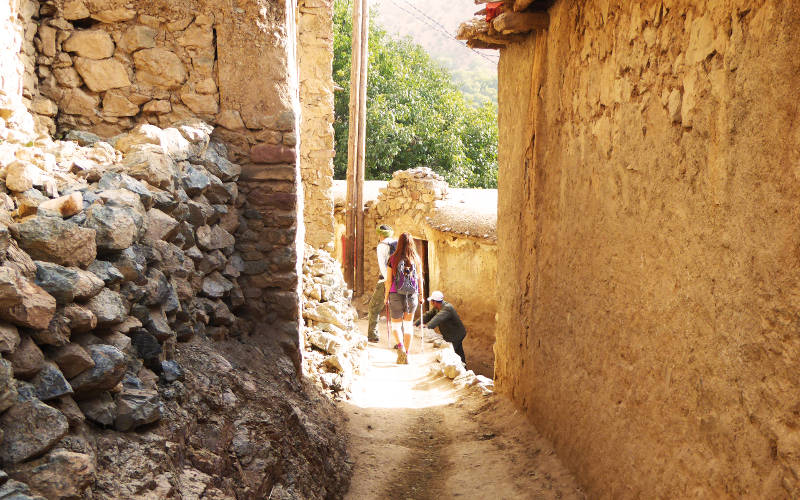
Inside a Berber village. Many of these villagers have Gites (hostels), where you can sleep the night.
Another option to acclimatise is to spend the night in Aroumd. This is on the way from Imlil and the village has plenty of gites (villagers homes) available. This way you would spend one night in Aroumd and the other at the refuge.
For a longer acclimatization, you are able to begin the trek in Ouirgane rather than Imlil. Ouirgane is a Berber village further from Imlil. You will have to spend two nights in different gites before reaching the refuge. This route is ideal for those who want to ensure they are properly acclimatized.
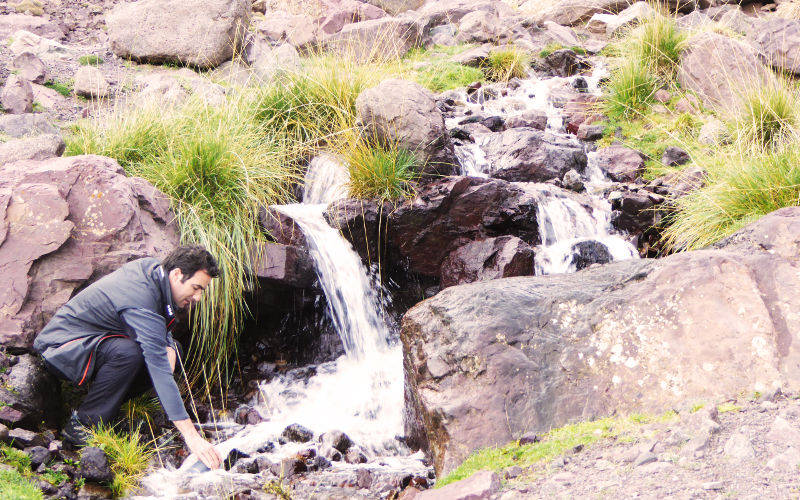
There are many streams in the High Atlas where you can collect water. Just make sure you bring water purification tablets to purify the water.
Toubkal Winter Ascent
Toubkal in Winter is more technical than a Spring or Summer trek as the terrain is completely covered in snow and ice.
Winter ascents of Toubkal start in November and run all the way through to the end of April.
A winter climb of Toubkal is achievable by someone who has never hiked on snow, but we highly recommend you do some basic winter mountaineering practice before undertaking the challenge.
The skills you need to be confident with are:
- Walking in crampons across snowy / ice surfaces, with mixed rock
- Using a straight handle ice axe to sturdy your balance and anchor your hike in areas that are a little exposed
- Confidence on 30-35 degree snow slopes
- Ability to traverse steep sections (sometimes you may need to hold or clip into a fixed rope, although this is rare).
- Ability to scramble up a mixed terrain surface of rock, snow and ice with crampons on
None of these skills are particularly difficult, but if you are doing this for the first time they can be scary and challenging. Hence, why we suggest you get some practice winter mountaineering skills.
Also, at high latitude and when the weather is bad, seemingly easy terrain can appear very challenging.
We recommend taking an experienced guide / joining an organised group if you are not very experienced. Guides are not instructors though. Most will not be able to formally train you on how to hike in snow, use an axe and crampons. It is up to you to determine whether you can handle utilizing these tools and manage on snowy terrain.
Join a Winter Mt Toubkal Hike
Toubkal refuges, les mouflons vs. cabine alpine francais (caf).
When climbing Mount Toubkal, you will most likely begin from the village of Imlil. It will take you about 5-7 hours to get to the Toubkal Refuges. It is not recommended that you complete the trek to Mount Toubkal in one day. You should be stopping here or at other villages to get your rest before completing the trek.
There are two Mount Toubkal Refuges. There is Les Mouflons and Cabine Alpine Fancais (CAF). The Les Mouflons is named after a deer (Mouflons) found in the Atlas Mountains. Cabine Alpine Francais is also called the “Neltner”, named after Mr. Louis Neltner, a geologist, and mountaineer. You are able to book both refuges online in advance.
The Refuges’ are by no means luxury, but they do the job. They are dorm style and have shared bathrooms.
When choosing a refuge, Les Moulfons is less expensive than CAF, so if you are on a budget choose Les Moulfons.
CAF has slightly better amenities (kitchen, rooms, toilet / bathroom facilities) and because of the higher price tends to be less busy.
It is always a good idea to bring some snacks of your own, as the Refuges offer very basic food. Take advantage of your time in Marrakech and purchase some delicious dried fruits and nuts.
If the weather is good and you have camping equipment, it is possible to camp outside the Refuges.
Getting to Morocco and Toubkal
To get to Mount Toubkal, you need to fly into Morocco. The closest big city to Mount Toubkal is Marrakesh. The only international airport in Marrakesh is the Marrakesh Menara Airport. The drive from the airport to Imlil is about 1 hour and 30 minutes. If you are planning to trek with an organised group then most meet in Marrakesh where you will likely overnight and explore the city.
The trip from Marrakesh to Imlil will cost you around 75 dirhams ($8) per person in a shared taxi, or 300 dirhams ($30) in a private taxi. Be careful when taking a private taxi and agreeing on a price. They will overcharge so negotiate with the driver as much as you can. The shared taxi station is near the Sidi Mimoun Garden.
Please note: There is no need to obtain the Moroccan Dirham ahead of your trip. You will be able to exchange currency upon arrival in the airport. It is a good idea to have some cash on you for your taxi, food, and the tipping of guides.
Best Time to Trek Toubkal
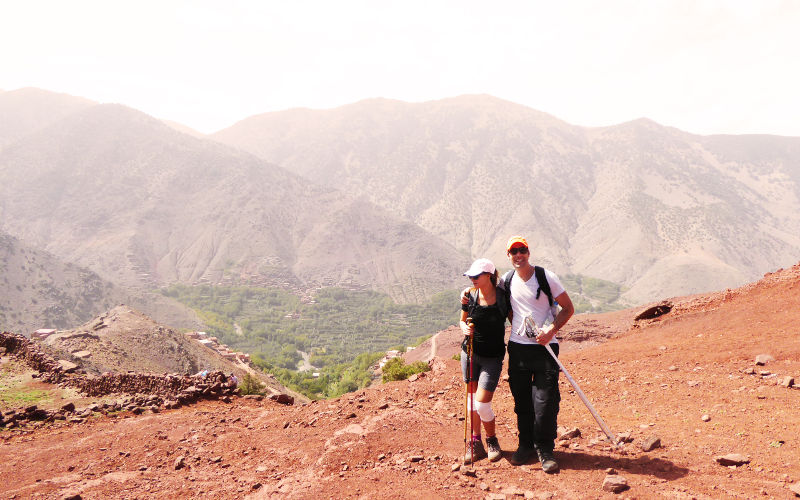
During the Spring and Summer months, the weather is hot throughout the Atlas. Temperatures drop in the evenings and early mornings. Winter months in the High Atlas are cold.
Trekking Mount Toubkal can be done all year round.
The best time to hike is in the Spring, April or May. The weather is not too hot and you are still able to see some snow on the mountains. Due to the rewarding weather, Spring is peak season.
The Summer months - June through to August - are usually very hot. Trekking in the Atlas is fine, but make sure you drink loads of water.
September and October are good shoulder months for trekking.
In Winter, from the month of November to April-May, Toubkal becomes a technical climb. You will need special equipment such as an ice axe, crampons, and fixed rope (see Toubkal Winter Ascents above).
How Difficult is Toubkal?
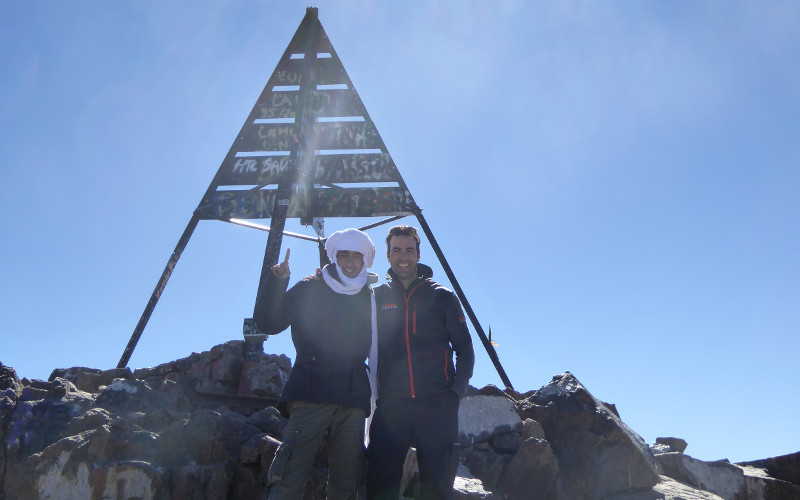
The summit of Mount Toubkal (4,167m)
Toubkal is a moderately difficult hike due to the high altitude. The actual hiking itself is pretty easy and the summit approach from the south side from May-October is relatively straightforward.
Winter ascents from November through to April are much more challenging. To undertake a winter ascent we highly recommend doing a basic winter mountaineering course, where you will learn how to use crampons and an ice axe. You should know the basics of how to do an ice axe arrest and be confident on 30-35 degree snowy slopes.
In terms of training, you will need to be comfortable walking for numerous hours each day for several days. At a minimum you should do one or two multi-day practice hikes that last 4-5 hours a day in your home country.
It would also be smart to build up endurance by doing a month or two cardio gym training before your trek. If you have managed multi-day treks in the past you will do just fine.
Mount Toubkal Gear List
The packing list for climbing Mount Toubkal is relatively straightforward. If you are trekking in the Spring and Summer months, then you can expect pretty good weather. Rain is always a possibility and temperatures in the Atlas mountains do get quite cold at night.
In terms of clothes you should think about layers - base layer , fleece layer, warm outer layer. See recommend items below.
In terms of Winter ascents on Toubkal, you will need more layers - specifically a hard shell waterproof jacket and trousers, a warm outer jacket (down or synthetic) and additional layering for your hands, feet and head. You will also need some technical gear, like crampons (and rigid sole boots that can take crampons), a straight handle ice axe and potentially a harness and carabiners to clip into a fixed rope (please confirm requirements with your tour operator).
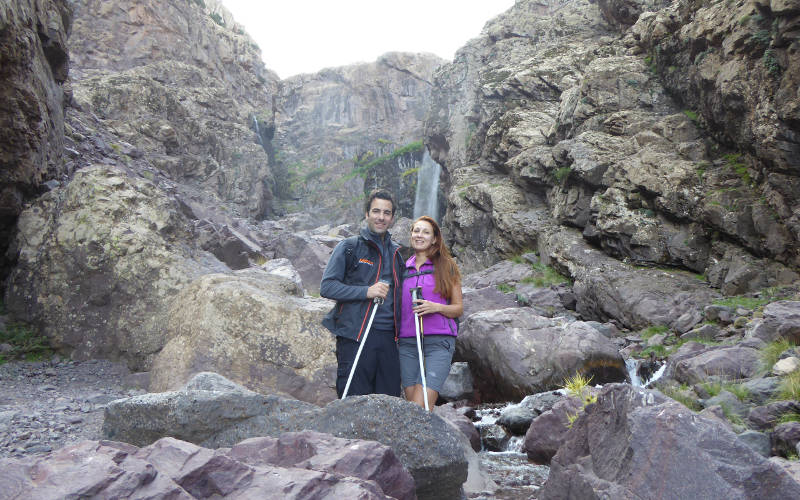
Packing list! In the summer and spring months, the climb doesn't require a lot of gear. Winter ascents will require more gear.
- Thermal baselayers (temperatures decrease in higher altitudes)
- Lightweight waterproof jacket
- Fleece jacket or warm jumper
- Trekking trousers and shorts in Summer
- Good trainers for valley treks / to wear after a days hiking
- Mid-weight hiking boots
- Lightweight thermal or fleece gloves
- Sunhat /warm hat
- Head torch and spare batteries - the summit push usually happens before sunrise!
- Personal lock (for unattended bags)
- Water purification tablets or water filter
- Trekking Poles
- 4 season sleeping bag (winter), or light 3-season sleeping bag (summer)
- Water bottle
- Soft Sided duffel bag (50-80 liters) - carried by mules. If trekking independently, then a 50-60L backpack.
- Lightweight day pack
Toiletries and First Aid
- Sunblock for body and lips
- Antibacterial hand wash
- First aid kit: antiseptic cream, diarrhea treatment, throat lozenges, painkillers, plaster and blister treatment, hydration salts, insect repellent
Other Items:
- Toilet paper
- Sleeping bag liner
- Therm-a-Rest (cushion for sleeping bag) - optional!
- Pen knife (keep in hold luggage when traveling)
- Repair kit (thread, needle, duct tape)
Winter Trekking Gear
- Ice axe - straight handle (60-70cm)
- Crampons - and hiking boots that can fit crampons
- Waterproof hardshell jacket
- Waterproof, lined trousers
- A warm synthetic or down jacket
- Gloves (inner thin and outer thick pair)
Important Info To Know Before Trekking Mount Toubkal
Visa, vaccinations and safety.
When entering Morocco, you are required to have a passport that has at least 6 months of remaining validity and two blank pages within the passport for entry and exit.
Most countries do not require a tourist visa to enter Morocco for a duration of 3 months. These countries include Britain, Australia, New Zealand, Canada, U.S., Japan, and other EU countries. South African citizens require a visa. Check with your relevant embassy or official Moroccan consulate for other nationalities.
If you are arriving from an area at risk of Yellow Fever, you will need your International Certificate of Yellow Fever.
Other vaccinations that are a point for good measure include diphtheria-tetanus-polio, measles-mumps-rubella, hepatitis A, and typhoid.
Road safety in Morocco is a concern. Make sure you only take rides with licensed taxi drivers and don't be afraid to ask your driver to slow down.
Morocco is a predominately Muslim country and therefore a conservative approach to dress and public behaviour should be adopted at all times. Sexual relations outside of marriage and homosexuality is prohibited. If you are travelling with your partner it is not unusual to be asked to show proof of marriage before checking into a hotel.
For more information on safety whilst travelling in Morocco, check out the UK FCO website .
People, Culture and Other Things To Do
Moroccans are people of Berber, Arab and Arab-Berber descent. The population is 33 million and most people follow the Islamic faith.
Morocco has many other cultural influences from countries like Europe, The Middle East, and Sub Saharan Africa. Women and men dress in a djellaba and men wear a red cap, a burnoose, for special occasions.
Moroccans are known for decorations and rich colours. The red colour is found naturally in most of the buildings. Moroccan cuisine is something you must try while visiting. It is extremely flavourful. Moroccans are famous for couscous, tajine, pastille, halwa, and mint tea served from a traditional long spouted teapot.
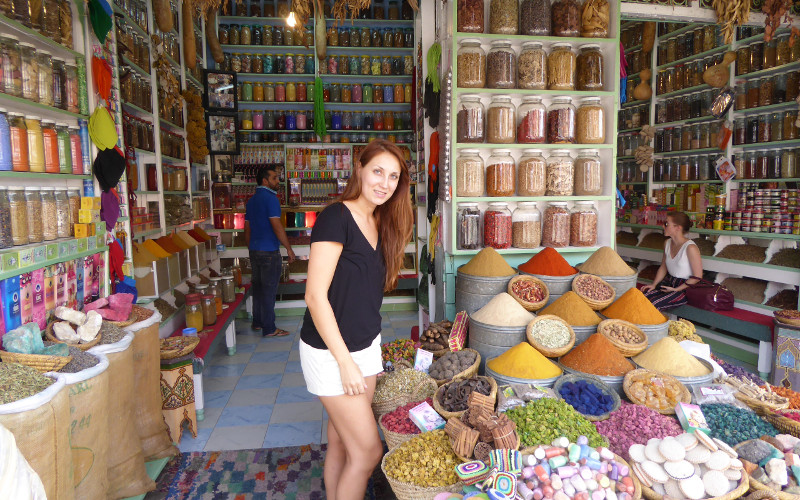
Moroccans are hospitable and welcoming to tourists. As most people follow the Islamic faith, it is important to be mindful of this. Both men and women need to be considerate of their dress, especially in rural areas. Women should cover their arms and shoulders, and wear garments that cover from the knees up. Men should cover their shoulders and be covered above the knee as well.
When entering a home, it is expected that you remove your shoes and follow the host. You are expected to leave tips. The rule of thumb is waiters at cafes receive about 1dh each, restaurants 5dh, and porters 5dh. However, taxi drivers do not expect a tip.
On Mount Toubkal you are able to go on skiing towers in wintertime, horseback and camel riding in the Atlas Mountains, and visit other mountains and Imperial cities. Morocco has so much to offer other than trekking Toubkal. Whether you want to shop the marketplace of Jemaa el-Fnaa, visit the Majorelle Garden, or explore the Sahara Desert and its wildlife. You are in for a vivid adventure.
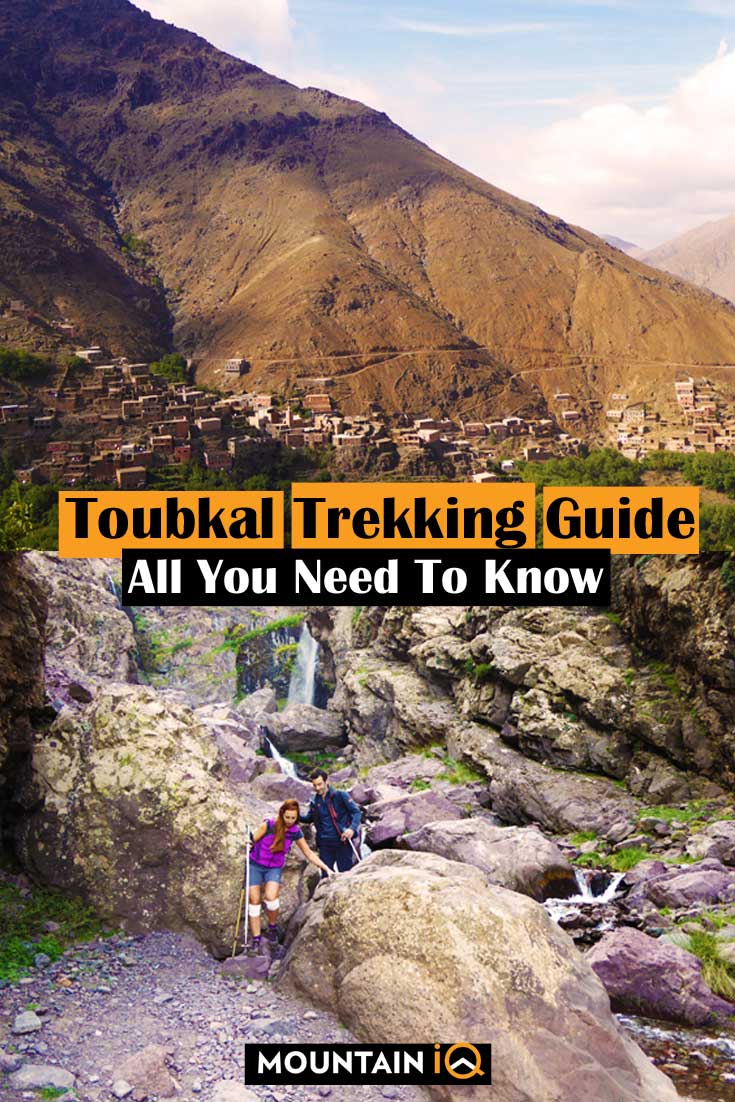
About the author
Mark Whitman
Mark has trekked extensively in Asia, Europe, South America and Africa. He founded Mountain IQ in 2014 with the sole aim to be the best online information portal to some of the most popular mountain destinations around the world. When not writing for Mountain IQ, Mark is out exploring the outdoors with his wife!
Leave a Reply
Your email address will not be published. Required fields are marked
i work as a guide in toubkal massif and i climb mount toubkal once a week everything you said is true thank you very much for sharing your experience with the world and making our region popular
2 Day Climb of Mount Toubkal
My girlfriend and I recently completed the 2 day Jbel Toubkal climb and it was without a doubt the highlight of a fantastic week in Morocco. We booked through Viator and were informed in our confirmation email that private-marrakech-day-trips.com would be our operator.
The transfers to and from the start point of the trek were good with a large and very road worthy 4×4 (i believe they also use these vehicles for the Sahara tours) taking us directly to and from Imlil the start point.
The trek itself is quite tough, with the first day taking 5 hours of uphill walking in moderate heat (this was July) and the second day being around 10 hours of walking! We were quite fit but relatively inexperienced so having a guide was a must. Omar our guide was excellent throughout.
A number of people we met on the mountain did not have a guide which did make me question the need for one. Regarding that question i can say emphatically that IT IS WELL WORTH HAVING A GUIDE! Even if you are a well experienced mountaineer the paths up Toubkal are very steep and not particularly clear at times. We saw many unguided people get abit lost and having to backtrack (usually to follow us). The guide also arranges all your meals and transfer of your excess luggage by mule, your accommodation and more. Having these done for you especially on the short 2 day trek is great. Also i doubt organizing these things would save you much money anyway as in Morocco there is a price the locals pay and a price tourists pay (as with most places).
Top tips: Take water with you as it is expensive on the mountain and your mule can carry the pre-bought supplies. If you want a more relaxed pace then go for a 3 day option (2days is quite intense). Take you camera because the scenery is amazing.
Hi – I’m considering doing this trek (probably in September/October time) and was wondering if you could tell me how much exposure there is? I’ve done quite a lot of trekking before but sometimes get a bit nervous if I have to hike along sheer drops for a long period of time. Is there much of this on this trek or is it mainly up the valley to the summit as it appears from your photos? Thank you – Anna.
Hi Anna, Sept / Oct is the summer season so there is basically no serious exposure. There are a few sections that require minor scrambling but in general Toubkal in the summer season is straightforward.
Very useful thanks. Just a bit surprised with the photo of woman in shorts and short sleeved tee shirt, just above paragraph on considerate dressing!!
Hi there, I enjoyed reading your article. I am in Morocco and I really want to hike the Toubkal mount but I want to do it in one day. I think I can say I’m an experienced hiker, recently I hiked Katahdin mountain in Maine USA. It’s not so long, around 8000 meters long and elevation gain of 3,982-ft, this trail is considered very strenuous clim and is very exposed. Do you think Toubkal can be done in 10-12 hours? And also alone without a guide. Just using trekking apps like Gaia.
Yes, Toubkal can be done in a day from Imlil, but you will need to be ultra fit and well acclimatised. Most people hike from Imlil to the refuges, overnight and then do Toubkal in the morning before returning to Imlil in the afternoon.
Great info, Thankyou. My husband has knee pain at the moment (usually comes and goes and settles down with time so he is still able to walk ok) but I’m wondering how bad the actual track is. I’m stressed if his knee is still playing up for our trip in Sept he won’t be able to go. Any extra advice/thoughts would be appreciated! 😫
Hi Mandy, the hike is pretty demanding and you will be on your feet for 5-8 hours a day hiking. The summit push is particularly long and hard. Coming down may be the biggest challenge for your husband. I recommend he takes a knee support and uses trekking poles.
Hi! We are going to trekking at the beginning of October. Is it true that taking a local guide from the control post at the village Armed is obligatory? We are experienced mountaineers and I am a certified Mountain Guide in Slovenia. Thanks for the answer.
Hi Marko, it’s been a while since we were in Morocco so things may have changed, but we didn’t need to take a guide when we went in 2014. If you do eeed a guide, you can get a super affordable deal on Skyhook: https://www.skyhookadventure.com/trips/toubkal-summer-ascent
Great information. Thank you for the post.
I will be climbing MT. Toubkal around July 23-24. Flying in Casablanca for a week to climb and tour Morroco. If anyone's itinerary is similar and would like to join would be great.
23rd Casablanca-Marrakesh-Imlil-Agadir-Essaouria-Safi-Casblanca. Flu out on July 28
Hi Abraham, you can join an open group trip here: https://www.skyhookadventure.com/trips/toubkal-summer-ascent
We work with local guides to offer great value adventures at unbeatable prices

Toubkal Trekking is a local Adventure Travel company based in Marrakech. The company was founded by a group of Mountain guides from Toubkal area led by Mustapha Bouinbaden who is actually the driving force behind the Toubkal Trekking company.
Toubkal winter climb
- Information
475£ per person
This is a fantastic Mount Toubkal winter climb which is also a great learning experience for winter skills. Climb up the highest peak in North Africa and in Morocco in winter months.
Our Toubkal winter climb itinerary:
On day one, we pick you up and transfer directly south toward the Atlas mountain peaks. In Imlil you can stay in a local lodge. After lunch, we go for a short walk round the town and pick up any rental gear that you may need. 1h30 drive + 2h walk.
On day 2, after breakfast we trek up the valley to a small shrine called Sidi Chamharouch. From here, we wind further up the Isougouane valley to the Toubkal Refuge at the foot of the main west face of Toubkal and surrounded by a cirque of peaks. It will take around 5 to 6h walk. Overnight
The next day, after an early breakfast we walk up the valley towards Ras n’Ouanoukrim peak 4068m. This summit is Toubkal’s neighbour and the second highest peak in the Atlas Mountains. First, we climb the remainder of the Isougouane valley, perhaps up to the narrow but impressive col of Tizi n’Ouagane pass, with views out and down to the next valley. sleeping back at the refuge for a second night. around 6h walk.
On day 4, it is the Toubkal summit day. We traverse and ascend the south facing cwm over mixed ground of snow, ice and rock, through various undulations and bowls. Eventually we emerge out into the sunlight at the col of Tizi n Toubkal at 3940m. From here, we move up along the SW ridge and a little higher up get a spectacular view of the SE face of Toubkal and the black triangle of the summit. We will enjoy amazing views from this great summit. Walk back down to the refuge via the same route. Lunch in the refuge & overnight. around 6 to 7h walk.
The last day, after breakfast we walk back down to Imlil valley via the same route. Then, we stop for lunch in imlil before transfer back to Marrakech. 4 to 5h walk + 1h30 drive to Marrakech.
If you want to experience a summer Trek, we have the Toubkal circular Trek .
Not Included
Day 1: marrakech - imlil valley., day 2: imlil - chamharouch shrine - toubkal refuge., day 3: refuge - ras n'ouankrim peak - refuge., day 4: refuge - toubkal summit - refuge., day 5: refuge - imlil - marrakech..
Automated page speed optimizations for fast site performance
The Complete Guide to Climbing Morocco's Mount Toubkal
:max_bytes(150000):strip_icc():format(webp)/Becker1-5b734a56c9e77c0025caddbd.jpg)
Getty Images
Mount Toubkal
Standing 13,671 feet (4,167 meters) in height, Morocco's Mount Toubkal holds the distinction of being the tallest mountain in Northern Africa. Located in the heart of the Atlas Mountains, Toubkal is a popular trekking peak, drawing thousands of visitors on an annual basis. And while it may not be as tall as its African sibling Mt. Kilimanjaro , it still holds a significant challenge for hikers looking to reach its summit.
If you're planning on visiting Morocco in the near future and are looking for an adventurous outing, a Toubkal climb may be exactly what you're looking for. But before you set out for the High Atlas, here is everything you should know.
Difficulty of the Climb
While Toubkal is mostly a non-technical climb –– meaning it doesn't require ropes, safety harnesses, or crampons –– it still offers a moderate challenge for experienced hikers . The mountain's height can make a trek to the summit a difficult one for those who aren't use to the thin air that comes with altitude or aren't in good physical condition . That said, this is an approachable climb for anyone who has a good sense of adventure, doesn't mind roughing it a bit, and enjoys a walk along an alpine trail.
What Toubkal lacks in altitude however, it more than makes up for with prominence. The mountain ranks 36th in the world in terms of total prominence, which is the distance from its base to the summit. In this case, Toubkal rises 12,320 feet (3755 meters) above the surrounding landscape, and climbers will have to hike up that entire distance to reach the summit. That's a lot of vertical gain and loss throughout the hike.
As noted, Toubkal is mostly a non-technical climb, though loose scree on the upper slopes of the peak can make trekking just below the summit a challenge. During the summer months, hikers can scramble up this rock and debris without too much trouble, but in the winter, ice and snow can add an additional layer of difficulty. During those times of the year, it may be necessary to use an ice axe or crampons to make your way to the top.
Safety Tips
Much like climbing Kilimanjaro, a trek to the summit of Toubkal is very safe. The trails are clearly marked and very easy to follow. For the most part, this is simply a challenging hike to the summit of a tall mountain with limited exposure to any kind of real danger. Serious injuries to climbers are a rarity, as are fatalities.
That said, there are certain inherent risks that come with hiking in high alpine environments, including the chance of contracting altitude sickness. This can lead to headaches, upset stomachs, and cause nausea, amongst other symptoms. Altitude sickness can also make it difficult to sleep or maintain an appetite as well. In severe cases, it can even lead to severe illness or death.
Fortunately, Toubkal's relatively low altitude means that these issues aren't a concern for most trekkers, but it is important to be aware of them before setting out.
Hiring a Guide
You do not need to hire a guide to climb Toubkal. If you are an experienced backpacker and feel comfortable in the wilderness, you can choose to go it completely alone, and many trekkers do just that.
Hiring a guide does bring some nice benefits however, including connecting with like-minded travelers on the trail and having someone to show you the best way to get to the summit. A guided trek also brings a higher level of safety too, as you'll have someone who is familiar with the mountain watching over you and checking on your health and wellbeing along the way.
If you're looking to join a guided trek, there are a number of good ones that can be found online, and we'll share some of our favorites below. But if you decide to wait until you're in Morocco to hire someone, that is fine too. You'll find plenty of local operators to book with in Marrakech and Casablanca , as well Imlil, a village located close to the mountain itself.
How Long It Takes to Climb the Mountain
One of the most common questions that hikers have is "how long does it take to hike to the summit of the mountain?" The actual number of days varies depending on whether you hire a guide or choose to go it alone, as well as your own physical conditioning.
Most guided Toubkal treks spend three days on the mountain, with the bulk of the climbing done on the first two days, with the descent coming on the third and final day. Some tour operators may add an extra day or two to help with acclimatization or for bagging smaller peaks nearby.
If you're making a self-guided trek up Toubkal, you can choose to go at whatever pace you like, spending as few as two days or many more. However, chances are if you feel comfortable enough going it alone, you'll probably be able to complete the climb in two to three days as well.
The Best Time to Go
While it is possible to climb Mount Toubkal at any time of the year, there are certain months that are better than others. In the spring, April and May provide cool, comfortable temperatures, with little rain or snowfall, and in the autumn, September and October tend to mirror those conditions.
During the summer months (June, July, and August) temperatures can be quite hot, making it a difficult time to be on the mountain. You'll still find plenty of trekkers making their way up Toubkal's slopes, but the warm conditions bring an added level of challenge.
In the winter, the mountain tends to be less crowded, but conditions are more challenging too. Snow and ice can make sections of the trail difficult to walk on, and it is not uncommon to use crampons or ice axes when approaching the summit. Less experienced climbers and hikers are encouraged to avoid December, January, and February, as high winds, cold temperatures, and unexpected snowstorms can increase the level of danger.
If you're looking to avoid the crowds, the shoulder seasons of late May/early June and late August/early September are a good time to go. In both cases, the weather tends to be manageable, but trekkers haven't necessarily started showing up in large numbers yet.
What to Expect on the Trail
As already mentioned, most Toubkal trekking itineraries are usually about three days in length. They tend to start in the village of Imlil and head up into the mountains from there. The early stages of the trek are easily managed, with only a slight, gradual rise in altitude. The day 1 route passes through another village or two along the way, and it is not uncommon to encounter vendors along the path who are selling food and drinks too. The trail is very easy to follow and offers little in the way of challenge.
After about four or five hours of hiking you'll reach the CAF Refuge, your campsite for the nights spent on the mountain. The Refuge can be crowded depending on how many other hikers are on Toubkal, but generally speaking, it is a relaxing place to get some sleep prior to summit day.
The next morning you'll launch your attempt on the summit at about sunrise. The second day brings more challenging trekking with steeper trails and rock-filled scree fields. It takes about three to four hours to reach the top, which is marked with a colorful, pointed tripod. On a clear day, the views from the peak can be very nice, but oftentimes, high winds can blow dust and sand into the air, obscuring even other mountains in the Atlas Range.
After spending some time at the summit, you'll head back down. The descent tends to be faster, requiring only two or three hours, but tired legs can make the hike a surprisingly difficult one. Loose scree can make for precarious footing at times, but trekking poles can prove invaluable for keeping your balance.
Once back at the Refuge, some trekking groups will elect to continue back to Imlil, completing the climb in just two days. Others will spend another night at the campsite before proceeding down the following day, which helps to break up the trek to a degree.
Gear to Pack for a Toubkal Trek
Traditional hiking gear and overnight camping equipment are a necessity on any Toubkal trek. You'll want a good pair of sturdy and comfortable hiking boots for instance, as well as comfortable hiking clothes that includes trekking pants and a breathable base layer.
Other recommended items include the following:
- Wind and waterproof jacket
- Trekking poles
- Sleeping bag and sleeping pad
- Backpack to carry all of your gear
- Tent (if trekking independently)
- Hat and sunglasses
- Light insulating layer such as a fleece pullover
- Light gloves
- Basic toiletries (toothpaste, chapstick, etc.)
If you're climbing during the winter, you'll also want warmer gear, including winter boots , thick socks , a down jacket , and a warmer sleeping bag too.
Climbing Toubkal With a Trekking Company
There are literally dozens of local trekking companies and guides that you can hire in Morocco that lead hikers up the mountain on a regular basis. Most are quite good at their job and take pride in what they do. But if you'd prefer to book a guide before you go, there are also some outstanding adventure travel companies that can handle all of the details for you. Here are a few that we recommend.
Intrepid Travel (7 Days) Intrepid Travel's Toubkal Trek is a bit longer than some others, but that's because the trip includes a few days to ascend North Africa's highest peak and extra time in Marrakech. This trip includes a stay in a traditional Berber home and an opportunity to explore Marrakech more fully too.
Flash Pack (5 Days) Based out of the U.K., Flash Pack specializes in organizing small group adventures for solo travelers in their 30s and 40s. The company's Toubkal trek is just five days in length, reasonably priced, and includes a day of unwinding at a luxury lodge in Marrakech after the climb.
Exodus Travel (8 Days) A leader in the adventure travel space for decades, Exodus Travel offers an eight-day trek up Toubkal that includes some pre-climb hiking through Moroccan villages, time to acclimatize prior to summit day, and bonus time in Marrakech.
KE Adventure Travel (Varies) KE Adventure Travel boasts seven different options for climbing Toubkal, including one itinerary specifically designed for teenage hikers and another for road cyclers . For the truly adventurous, the company even offers a winter ascent of the mountain, delivering a true mountaineering experience.
For further options for trekking Toubkal search online for other itineraries and hiking companies.
The Best Countries in the World for Adventurous Travelers
How to Choose and Prepare for a Hiking Trip
The World's Highest Places and Attractions That You Can Visit
Five Amazing Hiking Routes Among the High Mountains of the Himalayas
The Top 15 Things to See and Do in Morocco
Smith Rock State Park: The Complete Guide
The Highest Mountains in Peru
The Different Types of Adventure Travel
13 Amazing Trips to Take Before You Turn 40
The 10 Best Hiking Trails Found Inside America's National Parks
Extreme Adventure Travel Vacations
Mohican State Park: The Complete Guide
Want to Take Up Mountaineering? Get Started With These 8 Mountains
Izta-Popo Zoquiapan National Park: The Complete Guide
10 Best Mountain Treks in Africa
The 8 Most Adventurous Things to Do in Tahoe

Toubkal Mountain Winter Climb Trek
Toubkal winter guide – mt toubkal winter climb.
These winter climbs are different in nature to the summer climb in that they will be over snow and ice and require additional mountaineering equipment such as crampons and a walking axe. Mount Toubkal at 4167 metres is not a technical peak but you will learn some basic alpine techniques during the trip, such as walking on crampons and how to use a walking axe correctly and safe movement on snow and ice.
After being picked up from your accommodation in Marrakech at around 8:00 am, you will be transferred to Moulay Brahim Gorges onto the Berber town of Imlil (1750m). Imlil is situated on the upper foothills of the Western High Atlas Mountains, a natural paradise where trails set out in all direction. Here, we leave our vehicle and we meet our Mount Toubkal team for Berber tea before we start our trek heading along the Ait Mizane Valley towards the village of Armed. Build on a moraine spur overlooking the valley. Armed is the largest and the highest village in the Ait Mizane and provides an interesting mix of traditional terraced farming, Berber houses, and streets that seem to be permanently gridlocked by goats and cattle. Continuing east and crossing the floodplain, our route takes us along the mule tracks and up into the high rocky cliffs above the valley. Crossing the river, we eventually come to the pastoral shrine of Sidi Chamarouch, a famous place that attracts tourists and pilgrims. We then continue by zigzagging our way up to Toubkal Refuge (3207m), where we will spend the night. 6 or 7 hours walking.
Today, starts with an early wake up for breakfast around 5:30 am. We climb Jebel Toubkal, North Africa’s highest peak 4167m. The ascent will begin at 6:00 am; we’ll leave the Mountain hut and join a steep trail. The route initially zigzags eastwards directly above the Refuge and crosses snow covered scree slopes, before passing between tow rocky guardian peaks. We will stop a few times for a short break to have some water, orange and Moroccan nuts. Within 3-4 hours, you will be able to enjoy the magic views of Toubkal Summit and peaks over 4000m. Here, you will have the chance also to look at other valleys and Sahara direction. After that, we will descend down the same way to the Toubkal refuge where we will spend the night.
Today is potentialy a spare day for attempting Toubkal, but generally this isn’t required so after breakfast you leave the refuge and trek down into the Aremd Valley, via Sidi chamaharouch to reach Imlil Refuge, a transport will be waiting to take you back to Marrakech.
Mount Toubkal - Essential Info
At Mount Toubkal the World we believe in providing our clients with the best service and key to the enjoyment of any adventure holiday in our opinion is the balanced and up-to-date information offered by the tour operator. We are confident that the items detailed below when taken in conjunction with a reputable and reliable guidebook will enhance your Trekking experience as well as ensuring you receive the very best service from Mount Toubkal the World in the Atlas Mountains of Morocco.
M-T : STAFF
It is important that our staff in our Mount Toubkal office have experienced the wonder of High Atlas Mountains Trekking and are able to answer many of your important questions.
Mohamed, for example, has trekked in the Toubkal and Berber regions and visited many of the places included on our hiking itineraries; he has also made it to the top of Jebel Toubkal – many of the photos on our website were taken by him and his traveling companions on his various trips to the region.
M-T : GUIDES
All Mount Toubkal guides are fully licensed and are experienced from an early age in the Atlas Mountains areas, and guiding continues to be the heart and soul of who we are. We require that all of our guides undergo extensive safety training before officially joining us a mountain guide /or winter guide, local knowledge and guiding abilities. We believe that a local, licensed guide will offer more insight into the High Atlas region and Berber people as well as enhancing the local economy.
As well as a tip (see below) if you have had a great experience with your guide you may wish to offer him something of yours that will assist his duties.
Please be guided by your guide's expert advice on difficult or exposed paths and please respect the prayers of your guide and muleteers – they will usually do this outside of walking times so as not to interrupt your hiking.
M-T : PORTERS
Most of our porters are from the Atlas Mountain region who are able to perform carrying tasks in the high atlas and around all types of trails in Toubkal. They will carry your luggage, food and other necessary items in a safe and secure way. They are very conscious of maintaining your belongings in good condition. We would like to request all our clients to go with an open up and be ready to experience all the fun and excitement of your trek, and also rest assured that our Porters and Guides are comfortable and happy people to be accompanied by. You can ask any quarries you may have about the culture, people and country. You feel very safe, comfort and pleasure after hiring a Guide and Porter.
Credentials of our Porters
– They are of mid-age and able to carry 25-30 kg stuff without any hesitation.
– They are mostly from the Atlas mountain regions and have been working in the Trekking field as a Porter for many years.
– They are strong, powerful, capable and caring.
– They have more knowledge about the trails so they may alert you about the ways and other potential hazards.
– They are very honest and humble of their personal integrity.
M-T : MULETEERS & MULES & LUGGAGE
Your team of muleteers, along with mules, will vary in number depending upon the size of your group and whether you are camping or staying in gites/refuge but they will all perform the same function which is to provide a full back up service for your hike, cook and prepare meals and set up the evening camp.
The mule team will load up your luggage, food and, if relevant, the camping equipment at the start of each day but will not always walk either at the same time, pace or route as your hiking party so it is important that you consider which items you may require to carry yourself in the morning and then again in the afternoon as on some days you may only meet up at lunch-time.
The mules are completely used to carrying the loads and it is not unusual for them to carry in excess of 80 kgs each which is equally balanced in two baskets. The muleteers take great care in both hygiene and presentation of your food and perform wonders with such limited conditions.
We recommend you take your trekking luggage in a large holdall or rucksack which can perhaps be folded up inside your main luggage if you are also traveling around the Atlas Mountains and wish to have the security of your usual suitcase(s). You should also take a suitable daypack which will carry drinking water, camera, hat, raincoat, etc. as you may not be in direct contact with your support team at all times during the day.
In winter much of the region above 2500m can be snow-covered and hiking in these areas could require the use of crampons and ice axes. High winds and precipitation in whatever form may preclude some routes and this will be discussed before you set out or can be modified at any time with the advice of your guide.
We will maintain our programme of trekking during the holy month of Ramadan but we would ask you to respect your team by allowing them the courtesy of eating an early breakfast (before sunrise) and to avoid, where possible, drinking, smoking and snacking immediately in front of them during the day – they will, of course, prepare the usual lunch though as part of their duties.
It is important to drink lots of water during your hike; water can be purchased in Marrakech before you set off or in Imlil. It is also possible to obtain water from small kiosks in many villages and from the trailhead of Imlil and at the Toubkal refuge. You will need to carry some of this yourself but your mules will carry some more; please discuss with your guide the water requirements on a regular basis.
Breakfast - tea, coffee, juice, fruit, milk, bread, butter, jam, cheese, porridge
Picnic lunch - fresh Moroccan salad, cheese, sliced sausage, tinned tuna fish and sardines, bread, fruit, mint tea (pasta, beans, potatoes, and rice can also be included).
Dinner – Soup, Tajine (chicken or mutton with vegetables), spaghetti, couscous (main courses rotate depending on the duration of the trek, although you are more likely to get couscous on a Friday), bread, coffee, tea, cake, fruit.
* Vegetarians, vegans and those with special dietary requirements of any kind need to advise at time of reservation.
Naturally, tipping is an entirely personal matter and a little goes a long way in Morocco; however, we are always asked for a little guidance so here is what we would consider as fair, amounts refer to your guide, a smaller amount can be given to your muleteer team:
1-3 days hiking –150 DHS per person total
4-7 days hiking – 200 DHS per person total
7 days + hiking – 250 DHS per person total
Of course, you can offer more if you wish; tips are usually held and then passed over during a handshake to avoid any embarrassment or undue attention to the matter.
GRADING OF HIKES
Whilst we try to ensure that our descriptions are accurate for most people wishing to undertake hiking in the Atlas Mountains, clearly, there are many different factors that contribute to the difficulty of a particular hike.
These include the length of day, terrain, altitude and weather conditions. Since these factors are necessarily variable, any system of grades can only provide a general indication.
We have tried to make our system as clear as possible but it cannot account for personal abilities or experience.
CLIMBING MOUNT TOUBKAL
The hike to the top of this peak which is almost 960m up from the refuge will usually take at least 3 hrs and start at 5 am followed by a fairly hard 2-3 hrs walk down amongst the loose rocks by another route where possible. It is essential that you are fully prepared for what is for many people a demanding walk. Try to get a good sleep the night before and a good breakfast (plus a Mars bar!) before setting off.
You are likely to need warm clothes all year round and strong boots are essential, even in summer a warm hat would be useful as well as some protection from the wind. If you climb down the northern route then look out for the wreckage of a plane which hit Toubkal in bad weather in the early 1960s, purported to be carrying guns from Portugal.
ENVIRONMENT
It is vitally important that you respect the mountain environment; litter, in particular, is damaging the landscape and can injure animals. Please, please take all your litter home or drop it off at suitable points.
Mount Toubkal guiding teams are proud guardians of their natural heritage and will ensure that rubbish is collected and either taken out or burned where possible. In fact, our guiding teams have been known to take a few extra minutes to collect and burn the rubbish of groups that were not so environmentally sensitive. Some organic matter can be left as much of it will be eaten by the local goats.
The refuge is simple but offers warm showers, a few western toilets and a warm lounge with electric lighting in which to read or chat with your fellow hikers. There is a full kitchen for your team to cook in and a couple of dining areas. Please note that boots must not be worn in the refuge so sandals, shoes or flip-flops should be taken to keep your feet (and socks) warm, dry and clean.
Clothing and Equipment
You should dress according to altitude and the environment you will be located in. Most treks are in high altitude climates in remote areas. Therefore, there are often large temperature swings. Temperatures are often colder at high altitudes.
Clothing for Trekking
• Trekking boots or lightweight walking shoes. Having comfortable footwear is essential for a good trek. Make sure all footwear is broken in well prior to your trek. Do not break in boots on your trek,
• A tracksuit and a pair of track shoes to wear in the Refuge,
• Two pairs of woolen socks for trekking shoes and track shoes,
• Warm down jacket and rainproof jacket with hood for protection from rain,
• Woolen hat for the cold and sun hat or cap for sunny days
• A pair of woolen gloves and pair sandals to wear in Berber tea houses or camp,
• Two cotton T-shirts and two pairs of long shorts/skirts
• Woolen shirts and thick sweaters as well as wind and waterproof trousers,
• Pair of light or heavyweight trouser and one lightweight long sleeve shirt,
• Two pairs of thermal undergarments,

Equipment for Trekking
• Trekking or duffle bag to carry trekking gear. Mount Toubkal can provide a duffle bag for you to borrow during your trek. This will be returned after your trek,
• Ice Axe and crampons,
• Trekking daypack for personal items such as water, snacks, extra layers and camera,
• Water bottles,
• Sleeping bag,
• Travel Pillow,
• sunglasses,
• walking poles,
• Small torchlight or headlamp with spare batteries,
• Sunblock,
• Lip balm with sunblock in it,
• handkerchief or wiping papers,
• Money belt,
• First-aid kit,
Trekking equipment is available at Imlil Center. Mount-Toubkal can recommend shops for you to purchase equipment. If you do not wish to buy equipment, you can easily hire or rent them for the duration of your trek at reasonable prices.
- Round-trip Transportation between the trek and your accommodation in Marrakech.
- Expert winter guide, English-speaking
- Porters for luggage from snowline to the Atlas Mountain huts (refuge).
- Berber Cook
- All meals on the trek
- Accommodation in a Mountain Hut (Toubkal refuge).
- Travel insurance.
- Soft/alcoholic drinks & Water
- Tips and personal expenses
- Walking crampons
- Mules and muleteers to carry your luggage.
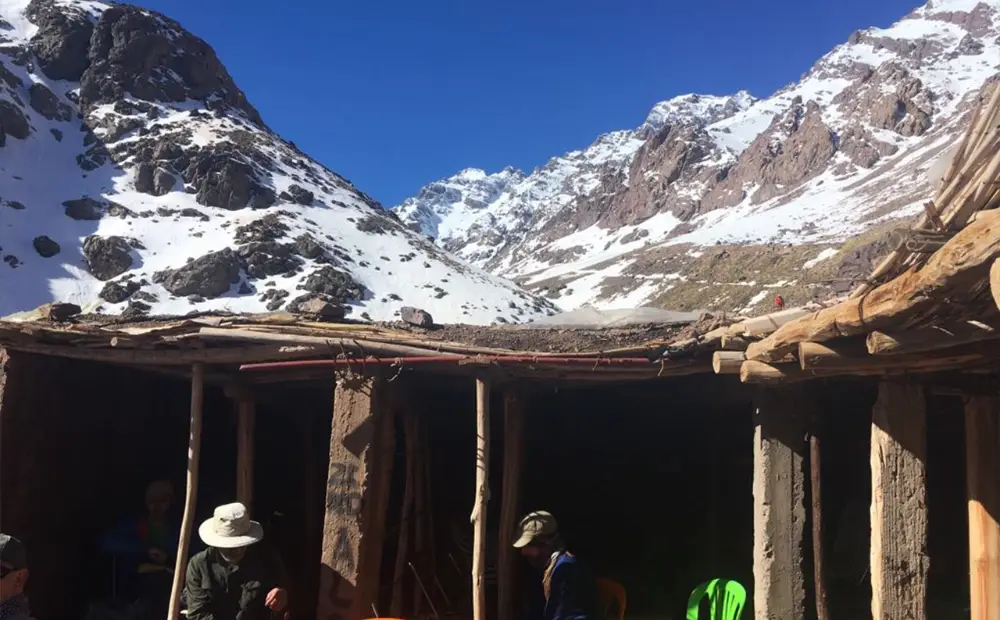
Book Toubkal Mountain Winter Climb Trek
- 00212 6 71 73 47 37
- [email protected]

Toubkal Winter
- Join With Us
- Walking Tours In Morocco
- Tour Details
- Include And excludes
Transfert from Marrakech aéroport to the hotel 4 starts .
Transfert from Marrakech to Imlil Acclimatisation day around the Imlil Valley. One option is to trek to a col Tizi M’zzik at 2660m. / 8727ft. in the nearby Mezzik Valley. ( neight in armed village )
Ascend to the shrine at Sidi Chamharouch. Continue ascent to reach the Neltner Refuge (3207m. / 10,521ft.) our accommodation for the next 3 nights.
Leave the refuge to make the day-climb of Ouanoukrim (4089m./ 13,415ft.). Time to rest and relax during the late afternoon. Refuge.
Today we make the steep ascent to the summit of Jebel Toubkal (4167m. / 13,672ft.) After time to enjoy the panoramic views we return to the Neltner Refuge. Refuge.
Leave the refuge and return down the Aroumd Valley, via Sidi Chamharouch to imlil night hotel.
Transfer to Marrakech and visit Marrakech and back to hotel 4 starts.
Transfert from the hotel to airport
What To Bring
For Tizi Trekking you need to prepare as you would for walking in any mountain region; it can be warm and sunny during the day but the weather in the mountains can quickly change from sunshine to snow and cold winds (autumn through late spring). Please do not leave any rubbish behind you; carry out what you carry in.
Tizi trekking are tailored to match the season and your level of fitness. You have the choice of basing yourself in Berber Guesthouses, from where you can take daily walks, or you can Atlas Mule Trek for 2+ days. On mule treks you usually have the choice of staying in Berber Guesthouse/with families or wild camping in 2-person tents. In addition to regular packing, here is a Check List for Tizi trekking:
- Good walking boots and socks
- Comfortable shoes/slippers for camp/guesthouse
- Trekking pants
- Lightweight waterproof over-trousers / rain-pants
Price included
Price excluded, related packages.

South Agadir Discovery
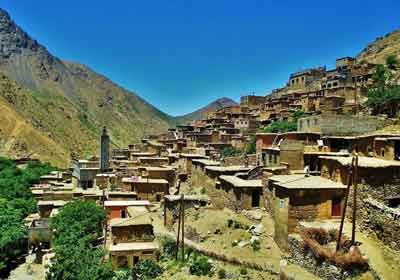
Berber Villages 3 Days 2 Nights
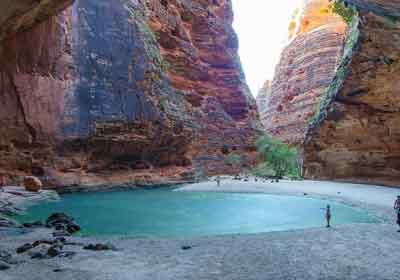
Cathedrale Gorges To Gorges
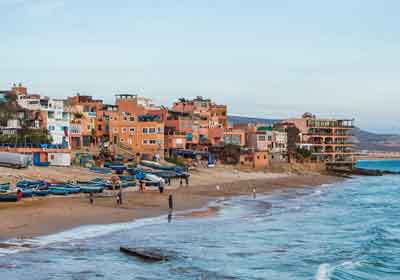
Atlantic Coast 8 Days
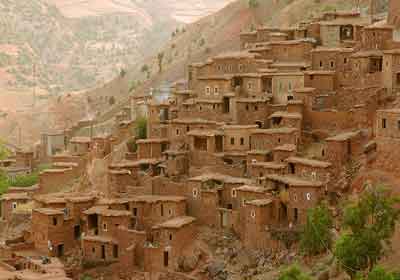
Berber Villages Lake Ifni 8 Days 7 Nights
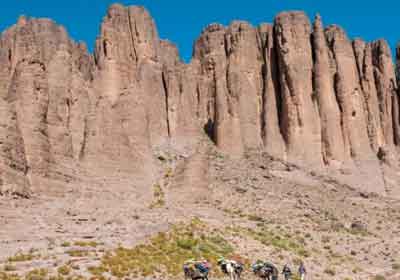
Djebel Saghro Volcanic Mountains 8 Days 7 Nights
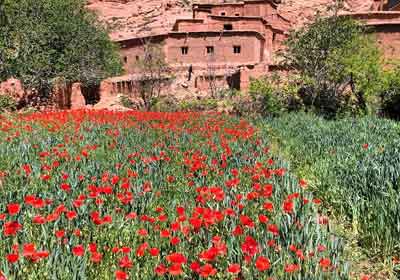
Valley Of The Roses 8 Days 7 Nights
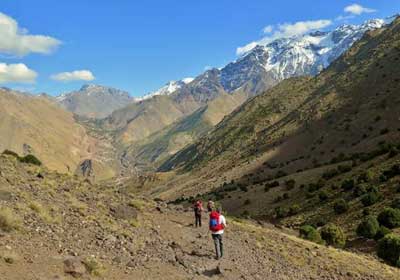
Tafraoute Its Surroundings
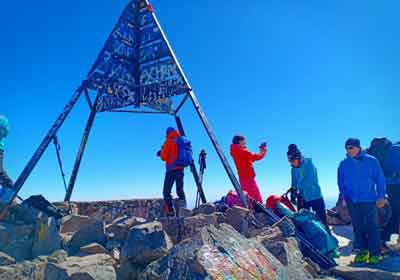
Toubkal Ascent 2 Days 1 Night
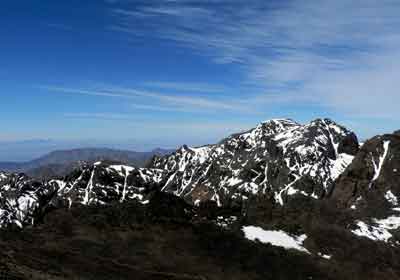
Toubkal Massif 15 Days 14 Nights
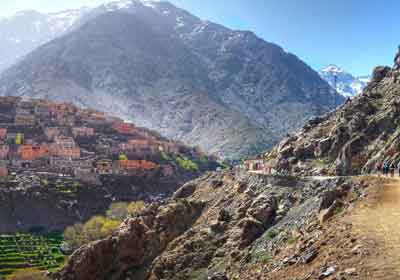
Djebel Toubkal Berber Villages 8 Days 7 Nights
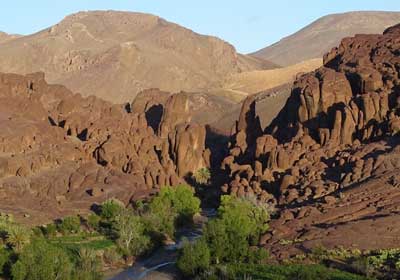
Djebel Siroua 8 Days 7 Nights
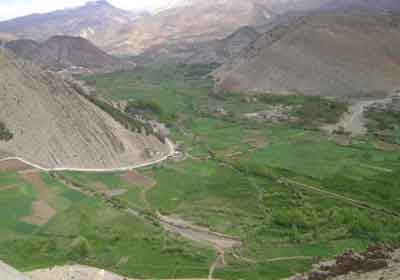
Djebel Mgoun Ait Bougmez Valley 8 Days 7 Nights
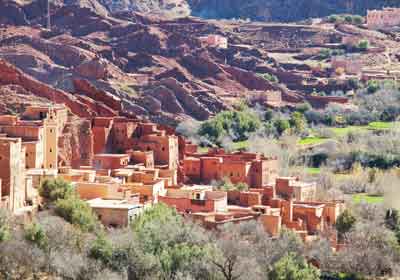
- Destinations: Mount Toubkal
- Starts / Ends In: Marrakech / Marrakech
- Age range: 5 to 70 years old
- Accommodation: Hotel, Tented Camp
- main attraction: Atlas Mountain,Jebel Toubkal
- Operator: Tizi Trekking
paolac399, Italy
I am a tour leader of avventure nel mondo and I was in touch with Mohamed for the organization of the tour. Everything was perfect: hotel, the bus driver Houssein and all the logistic. I strongly advice Tizi Trekking for the tour organization.
Caterina Zambianchi Italy
The cooperation with Mohamed was excellent. He is always at disposal of the group to support and solve any minimum problem. For sure I reccomend him if you have to organize a trip in Marocco. Accomodations and driver always very good!
PBalda, Italy
with a group of friends we did a trek on the Atlantic coast as a Essaouira destination; all organized to perfection: the trek with guides, meals and bivouac. Mohamed contacted before departure was timely in the answers and arranged everything perfectly. very positive experience.
AndreaRed1987 Italy
I have used different services for me and my group through Mohamed, (excursions, overnight stays, itineraries, van rental), his professionalism and his availability in advising places guides and excursions is really something of surprise! we spent a night in the desert that we will never forget ... with the patience of its drivers we have attracted half from Morocco, its predisposition and that of its team is something unique! There isn’t No word .... yes one ... thank you Mohamed !
Still have questions...
Suscribe to our newsletter.
Sign up with your email address to receive news and updates
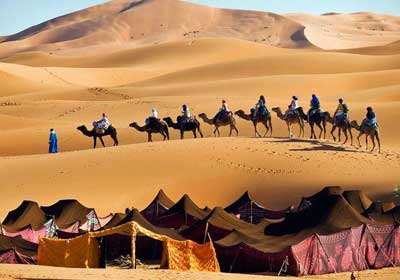
Admire Morocco that we understand that your group is unique, and your tour of Morocco should be too. Let us know what you have in mind, and we will take care of planning your vacation customized tour for you personally. And we will absolutely make sure that it suits your own budgets and interests!

Disover Morocco include arrangements for accommodations, transportation, and guided excursions throughout Morocco. Whether you are traveling solo or in a group, and/or looking for a cultural or adventurous experience, we are here to work with you in customizing the perfect itinerary for your holiday.
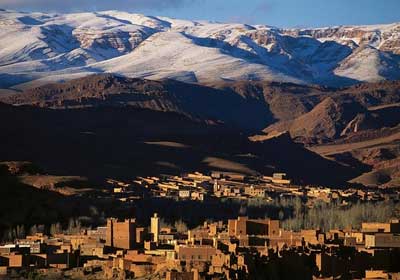
Sightseeing
Sightseeing In Morocco offers the most adventurous Sahara desert tours and authentic Morocco trips. You will be introduced to the most breathtaking natural beauty and exotic Sahara wonders while exploring its culture and visiting its most ancient cities. So experience the extreme excitement and live your own Moroccan desert dream.

Explore Morocco Trip where you’ll get the experience the diverse sights, sounds and tastes of Morocco. From the bustling and colourful markets of Marrakesh to camel rides across the Sahara Desert at sunrise, a holiday to Morocco has a bit of everything.
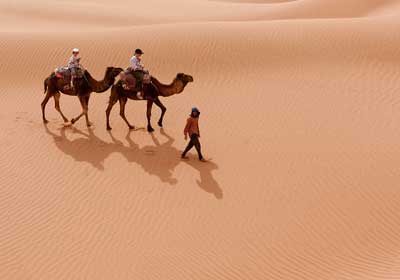
Enjoy Morocco with a range of customs, stories and languages. There are sparkling waters, rocky mountains, and the desert of Merzouga and Mhamid. Morocco continues to be a gateway between Africa and Europe and thus merges the values and traditions of the two groups that make this society and a country astonishing!

Experience Morocco Travel to get the best options for high-end authentic travel experiences across Morocco. Join us for a once-in-a-lifetime discovery of Morocco’s sights, scents, and sounds at the crossroads of Arab, Berber, and Mediterranean civilizations.
- morocco group tours
- luxury morocco holidays
- morocco family holidays
- morocco trekking holidays
- morocco private tours
things to do
- morocco beaches
- morocco art culture
- shopping in morocco
- morocco night life
- morocco activities
attractions
Travel tips.
- best time to visit morocco
- culture and customs in morocco
- eating and drinking in morocco
- geography and environment
- history and government
be Social With us
Company information.
ICE number: 002096597000014
Commercial register number: 93249
From the court of Marrakech
N ° of the professional tax: 46400057
Tax ID Number: 31893284
N ° of affiliation to the CNSS: 1294897
Mohamed El guellouti, Federal Mountain Guide & Trip Organiser
Address: DR Tamatert imlil B.P. 80 Asni Marrakech Morocco
Morocco - Phone: +212671734737
Email: [email protected]
Web: www.tizi-trekking.com
- privacy policy
- terms & conditions
- all about morocco
- destinations
Copyright tizi trekking 2019
Quick connect
Want us to call you back please fill the below form..
Any kind of business solution and consultion don't hesitate to contact with us for imiditate customer support. We are love to hear from you
Call: +212671734737 or Email: [email protected]
Request a call back.
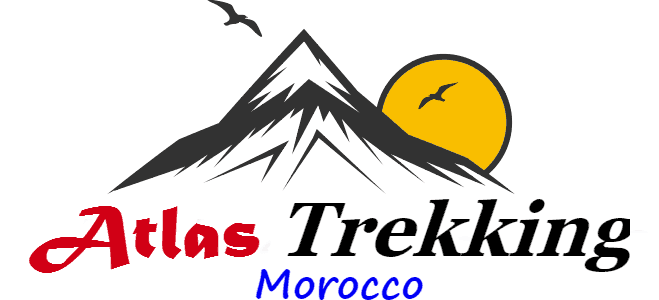
- Mount Toubkal Trekking in Morocco
- Trekking Toubkal National Park
- Ait Bouguemez Happy Valley Trek
- Mgoun Summit Trek Adventure
- Morocco Twin Peaks Trek Toubkal and Mgoun
- Trekking Morocco Long Traverse 22 Days
- Morocco Camel Trek Sahara Dunes
- Mount Siroua Peak and Valleys
- Saghro Massif Trekking Winter Adventures
- 2 Days Mount Toubkal Summit Trek
Winter Toubkal Ascent Trek
- Mountain Hike and Sahara Tour
- Combined Trip Mountains and Desert
- Mount Toubkal and Sahara Tour
- Atlas Mountain Valleys Trek
- Three Valleys and Berber Villages Trek
- Marrakech to Zagora Desert Tour
- Sahara Desert Tour From Marrakech to Merzouga
- Atlas Valleys and Sahara Tour
- Private Marrakech Sahara and Fes Tour
- Luxury Tour Morocco Imperial Kingdom
- 15 Days Morocco Grand Tour
- Classic Morocco Medinas and Kasbahs Tour
- Premium Morocco Tour Package
- Marrakech to Ait Ben Haddou Kasbah & Ouarzazate Day Tour
- Guided Hike Ouzoud Waterfalls Excursion Tour
- Day Trek Imlil Valley Hiking
- Essaouira Morocco Day Trip
- Ourika Valley Day Trip From Marrakech
- Atlas Mountain Day trekking Ouirgane Valley
- Morocco Mountain Cycling Tour
- Atlas Mountain Bike Adventure
- Family Trek Holiday in Morocco
- Morocco Private Family Tour
- Family Trip Atlas Mountains and Essaouira
- Country profile
- Essential Information
- DMC in Morocco
Use the form below to contact us directly.
Please complete all required fields.
Booking details
Submit booking, confirmation, booking info.
First name:
Special requirements:
Total price:
We wish you a pleasant trip your Atlas Trekking Morocco team
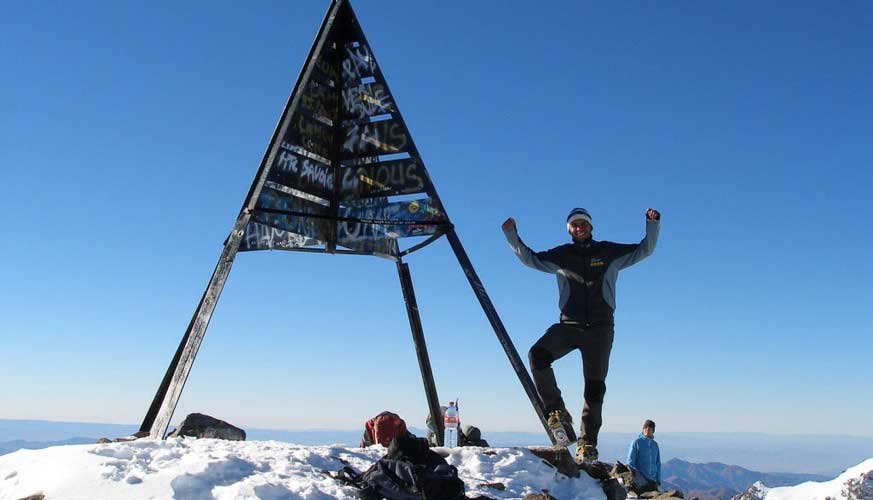
3 Days Winter Toubkal Ascent Trek
The snow-capped peaks of Morocco's High Atlas Mountains providing an impressive challenge adventure on a 3 days winter Toubkal ascent trek, (4167m) North Africa's highest peak. On a clear day we enjoy winter trek views from the Toubkal ascent across the Atlas range and over the Sahara Desert . En route trek we discover local villages and experience Berber hospitality.
The Toubkal Region containing all the highest peaks is by far the most popular region for trekers. Mt Toubkal is the highest peak in the Atlas Mountains and in North Africa. Situated 65 km south of the city of Marrakech and in the heart of Toubkal National Park. Bounded by the Tizi N'test pass to the West, and the Tizi N'tichka to the East.
Most of the trekking interest is concentrate in or around the central line of these peaks. Starting from Ouanoukrim and bearing onwards, North-Easterly to Annrhemes we finish with Angour.
Toubkal Ascent 3 Days Highlights:
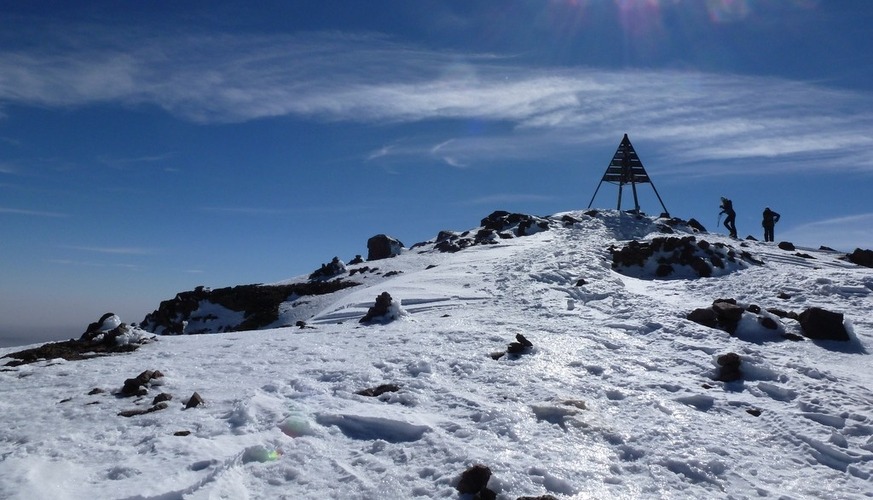
- Winter Ascent Climb Challenge Experience.
- Jebel Toubkal - Ascend to the summit of the highest peak in North Africa.
- Spectacular views across the High Atlas from Mount Toubkal summit.
- Easy to extend in Marrakech, Essaouira or the Sahara desert.
3 Days Toubkal Trek at a Glance:
- Day 1 : Marrakech - Imlil(1750m) - Neltner Refuge(3207m)
- Day 2 : Trek to summit of Jebel Toubkal (4167m) - Return to Neltner (3207m)
- Day 3 : Neltner (3207m) - Imlil (1750m) - Drive to Marrakech
Similar Winter Treks and Hikes:
- 2 Days Toubkal Ascent Trek
- 3 Days Toubkal Ascent Trek
- 2 Days Atlas Mountains Hike
- 3 Days Valleys and Villages hike
- 3 Days Trek Toubkal Summit and Valleys
- 4 Days Toubkal Peak and Sahara Tour
- 6 Days Trekking Atlas Mountains And Sahara Desert Tour
Trip’s Highlights
- Start and end in Marrakech
- Jebel Toubkal - Ascend to the summit of the highest peak in North Africa
- Spectacular views across the High Atlas from Mount Toubkal summit
- Easy to extend in Marrakech, Essaouira or the Sahara desert
Holiday Itinerary
Day 1 : Marrakech - Imlil(1750m) - Neltner Refuge(3207m)
Pick up from your hotel in Marrakech then drive to Imlil, a Berber village located about 65 km south from Marrakech, where our trek will start. Here we will meet with our local Berber muletiers crew to transport our food, luggage and other necessary equipment.then we start our trek heading along the Mizane Valley first towards the village of Aroumd and then up to the shrine of Sidi Chamharouch which attracts tourists and pilgrims. Built on a moraine spur overlooking the valley floor, after having our lunch, we continue our walk up to reach the Toubkal base camp at 3207m high.
1 hrs 30 min Drive / 5 hrs Walk / Meals: L, D / Night in the Refuge or camping
Day 2 : Trek to Summit of Jebel Toubkal (4167m) - Return to Neltner (3207m)
Early this morning we make our attempt on the summit of Jebel Toukbal, the highest peak in Northern Africa. Our route takes us up the south cirque, crossing the stream above the refuge and then heading across one of the mountain's numerous scree fields. The walking is relatively straightforward, but the scree and the altitude will make the going quite difficult in parts, however, the views along the way make the journey more than worthwhile. Cresting the ridgeline we find ourselves on the plateau, from where it is a short walk to the summit and the vistas out across the surrounding landscape are quite breathtaking. From here there are unrestricted views in every direction, from the Marrakech Plain to the High Atlas in the north and as far south as the Anti-Atlas and the Sahara. Pliny, the great Roman scholar, once described the High Atlas Mountains as the most fabulous mountains in all of Africa and from our vantage point high above the valley it is easy to understand why. Retracing our steps we return down the mountain to our camp at Neltner.
5 hrs Walk / Meals: B, L, D / Night in the Refuge or camping
Day 3 : Neltner (3207m) - Imlil (1750m) - Drive to Marrakech
Our walk this morning takes us same way down to the main village of Imlil valley (1750m) Crossing the pastoral shrine of Sidi Chamharouch, set beside a small waterfall and a jumbled cluster of village houses clinging to the rock face. Drive back to Marrakech
5 hrs Walk / 1 hrs 30 min Drive / Meals: B, L
Trek & Tour Informations
- Group 1 - 4 peoples : On request
- Group 5 - 9 peoples : 200€ /person
- Group 10 - 16 peoples : 180€ /person
- English speaking guide.
- All meals during the trek are included except in Marrakech B,L,D (Breakfast, Lunch and Dinner )
- Ground transfers by 4WD / minibuses : ( hotel - trek - hotel )
- Muleteers and mules / Camels for luggages
- Accommoadtion in a Berber villages (gites)
- Mess, cooking & toilet tents (camping option )
Not included.
- Travel insurance
- International Flights
- Sleeping bags
- Soft/alcoholic drinks
- Tips and personal expanses
- Entrance fees to the historical sites.
Availability.
* This trip is available to run from October to March. And can depart at any date of your preference.
Accommodation
- Local gites
Essential Equipment & Clothing:
- Good walking boots and socks / good trainers
- Personnel First aid Kit
- 3 to 4 season sleeping bag
- Day sack/backpack
- Head torch / headlamp
- Lightweight waterproof over-trousers / rain-pants
- Water bottle or camel back (recommended)
Group Size :
- Generally : 2 - 16
Payment: can be done in € / $ / £ or MAD
The snow-capped peaks of Morocco’s High Atlas Mountains providing an impressive challenge adventure on a 3 days winter Toubkal ascent trek, (4167m) North Africa’s highest peak. On a clear day we enjoy winter trek views from the Toubkal ascent across the Atlas range and over the Sahara Desert . En route trek we discover local villages and experience Berber hospitality.

The Toubkal Region containing all the highest peaks is by far the most popular region for trekers. Mt Toubkal is the highest peak in the Atlas Mountains and in North Africa. Situated 65 km south of the city of Marrakech and in the heart of Toubkal National Park. Bounded by the Tizi N’test pass to the West, and the Tizi N’tichka to the East.
- Start and end in Marrakech.
- Jebel Toubkal – Ascend to the summit of the highest peak in North Africa.

- Day 2 : Trek to summit of Jebel Toubkal (4167m) – Return to Neltner (3207m)
- Day 3 : Neltner (3207m) – Imlil (1750m) – Drive to Marrakech
- 3 Day Toubkal Ascent Trek
- 2 Day Atlas Mountains Hike
WhatsApp us

COMMENTS
Winter ascents of Toubkal start in November and run all the way through to the end of April. A winter climb of Toubkal is achievable by someone who has never hiked on snow, but we highly recommend you do some basic winter mountaineering practice before undertaking the challenge.
This Mount Toubkal winter climb is one of the most superb adventures holiday you will have during the European autumnal and winter months, at only a few hours flight to Morocco. Spend your full days adventure trekking in the snowy magnificence of the High Atlas Mountains of Morocco and summiting Jebel Toubkal, the highest peak in the Atlas ...
Climb up the highest peak in North Africa and in Morocco in winter months. Our Toubkal winter climb itinerary: On day one, we pick you up and transfer directly south toward the Atlas mountain peaks. In Imlil you can stay in a local lodge.
Located in the heart of the Atlas Mountains, Toubkal is a popular trekking peak, drawing thousands of visitors on an annual basis. And while it may not be as tall as its African sibling Mt. Kilimanjaro, it still holds a significant challenge for hikers looking to reach its summit.
Trek Mount Toubkal in Winter. The Atlas Mountains, from December to April, provide a great opportunity to put your winter walking skills to the test while climbing two magnificent snow-covered Moroccan peaks in a unique environment. From £875 Altitude 4,167m Grade: 1A.
We climb Jebel Toubkal, North Africa’s highest peak 4167m. The ascent will begin at 6:00 am; we’ll leave the Mountain hut and join a steep trail. The route initially zigzags eastwards directly above the Refuge and crosses snow covered scree slopes, before passing between tow rocky guardian peaks.
This 8-day winter trip is the perfect introduction to winter trekking in the High Atlas Mountains. Give the summit of Mt Toubkal a go, the highest mountain in North Africa.
Toubkal Winter. Overview. Tour Details. Include And excludes. During the winter, Mt Toubkal and the encompassing pinnacles of the High Atlas transform into a walker's heaven with void trails, clear air and astounding perspectives over the Toubkal Massif.
The snow-capped peaks of Morocco's High Atlas Mountains providing an impressive challenge adventure on a 3 days winter Toubkal ascent trek, (4167m) North Africa's highest peak. On a clear day we enjoy winter trek views from the Toubkal ascent across the Atlas range and over the Sahara Desert.
Mount Toubkal in Morocco is a justifiably popular trek, being easily accessible from Marrakech via the village of Imlil - the gateway to the High Atlas Mountains. During the winter months, the ascent from the Neltner Refuge at 3,207m to the 4,167m is often on snow and may require the use of crampons. If you're looking for a week-long winter ...